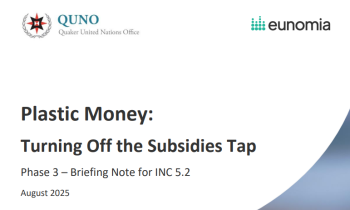Plastic Money: Turning Off the Subsidies Tap (Phase 3 – Briefing Note for INC 5.2)

This briefing note by the Quaker United Nations Office (QUNO) and Eunomia Research & Consulting presents the preliminary findings from the third phase of our "Plastic Money" initiative. Released in August 2025 to coincide with the second part of the fifth session of the Intergovernmental Negotiating Committee (INC-5.2) on Plastic Pollution, this work continues our effort to bring clarity and evidence to the global discourse on plastic subsidies.
Building on the insights and modelling from Phase 1 and Phase 2, this latest study expands the scope of analysis to include not only feedstock and energy subsidies but also a wider range of government support measures. These include capital investment grants, in-kind benefits, tax expenditures, and various forms of below-market financing. The study provides updated global estimates for such subsidies and models the environmental and economic implications of their removal.
As governments work toward a legally binding Global Plastics Treaty, the role of public financial flows—including subsidies to the production of primary plastic polymers (PPP)—has come under increasing scrutiny. Subsidies reduce production costs, incentivise new investment, and help make virgin fossil-based polymers more competitive than recycled plastics and competing alternative or substitute materials. In doing so, they reinforce a linear and extractive economic model and undercut efforts to transition into more sustainable and just patterns of production and consumption.
Key findings of the report include:
- Estimated total global subsidies to PPP in 2024 exceed USD 80 billion, and could rise to USD 150 billion by 2050 under a business-as-usual scenario.
- The removal of all estimated subsidies would result in a significant decrease in polymer production, particularly in economies that provide the largest levels of support.
- The impact on consumer product prices would be minimal, with average price increases below 1% for most plastic-containing consumer goods.
The overall aim of this project is to provide policymakers and negotiators with illustrative data to support decision-making on subsidy reform within the INC process. It builds on a foundation of country-level research, international databases, and economic modeling.
Acknowledgments: This third phase of the initiative has been supported by a grant from the Minderoo Foundation, whose contribution and collaboration are gratefully acknowledged. The findings and conclusions expressed in the report remain those of the authors.
You can find the full Phase 3 briefing note attached below.


